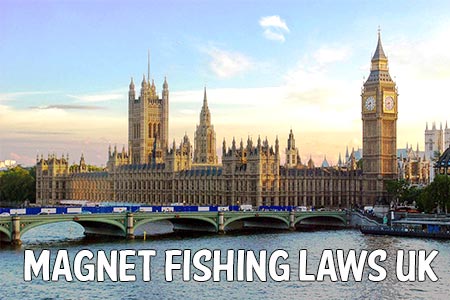Magnet fishing has boomed across Britain in recent years. This raises questions around legal rights and responsibilities when searching waterways. Read on for magnet fishing rules plus safety advice.

Is Magnet Fishing Legal in the UK?
There are no specific magnet fishing laws in the UK. However, normal trespass laws apply when accessing waterways on private land. You also need permission from authorities like the Canal & River Trust before fishing public waterways. Their concern is protecting wildlife and infrastructure like canal walls.
Magnet fishers must also abide by broader laws against handling firearms, explosives or potential criminal evidence. And food safety rules govern anything caught that enters the food chain. Following common sense precautions keeps the hobby trouble-free for most.
Where Can You Legally Go Magnet Fishing?
For Magnet fishing locations, choose public parks, rivers, canals and shorelines are fine with some general exceptions:
- Private land – Always ask owners before accessing any waterway
- Sensitive sites – Nature reserves often prohibit removing items
- Restricted docks, dams and reservoirs – For safety and security
- Any marked “no fishing” areas – Respect signage prohibiting access
When in doubt, seek guidance from local water authorities. Most support trouble-free magnet fishing if done considerately.
What Can You Keep From Magnet Fishing UK Rivers?
Non-dangerous metal items pulled from public waterways are usually yours to keep in the UK. For safety, clean then check anything first before adding to collections or selling.
Exception are guns, weapons, live ammunition and possible criminal tools. These get handed to police immediately – don’t risk illegal possession charges. Human remains also go straight to the authorities. Museums show interest in coins, artefacts and relics if verifiable as historically unique.
Can Magnets Damage Underwater Pipes or Cables?
In short – no. Modern pipes and cables use non-magnetic materials. Their sheer weight also resists pulling by even industrial magnets. So hobby magnets only attract smaller loose items. Still, take care around lock systems, just in case.
Is Magnet Fishing Environmentally Harmless?
Responsible magnet fishing helps waterways by removing rubbish, bikes and debris. But do take care around riverbanks. Limit foot traffic over vegetation sensitive to erosion issues. Avoid stirring up excessive sediments that harm wildlife habitats.
With some simple precautions, the hobby enhances natural spaces while offering safe outdoor adventures.
Magnet Fishing Dangers to Know
While a safe hobby overall, take basic precautions:
- Keep tetanus and hepatitis jabs up to date – river muck carries risks
- Wear sturdy waterproof gloves – junk has sharp edges
- Use tough ropes – don’t lose magnets to snags below!
- Magnet fish with others ideally – help reaches you faster if needed
- Check finds carefully – guns still hold live ammunition sometimes
Exercising judgement keeps magnet fishing risk-free for most people.
What is the Strongest Magnet You Can Use?
No legal limits exist yet. But very powerful neodymium magnets over 1,500lbs pull risk injury if handled incorrectly. Start under 1,000lbs pull strength until confident handling items attracted. Quality ropes also prevent losing control of heavier magnets if snagged.
Magnet Fishing Code of Conduct
While no national organization formally oversees magnet fishing, common codes of conduct have emerged:
- Seek permission for any private or restricted waterways
- Remove all junk pulled from waters responsibly
- Never intrude on nature reserves or protected sites
- Prioritize safety over finds; your health matters more
- Spread knowledge of magnet fishing considerately
Following such community guidelines keeps access open for all to enjoy magnet fishing across Britain.
Joining Magnet Fishing Communities
Numerous magnet fishing groups have formed regionally and online recently. Joining one near you brings friendship and guidance from experienced magnet fishers. You also give back by removing rubbish from waterways together or reporting dangers correctly. It helps to find the best magnet fishing location in UK.
Overall the helpful community makes magnet fishing better for new hobbyists. Just avoid any groups seeming exclusive or promoting illegal behavior of course!
Magnet Fishing: FAQs
Do magnets damage boat engines?
No. Modern propellers use non-magnetic bronze alloys. Attracting small loose items poses little risk nowadays.
Is magnet fishing allowed in London?
Yes, with Canal and River Trust permission. Groups responsibly clean sections of canal.
Can my finds be confiscated by police?
Only weapons or potential evidence may be seized. Other items are yours if following general laws.
Where can’t you magnet fish?
Private land, nature reserves or marked hazardous areas unless permitted by relevant authorities.
Will magnets attract gold or jewelry?
Strongly magnetic metals like iron yes. But precious gold, silver and gems – no.
Do I need a magnet fishing license?
Licenses don’t exist yet, just follow trespass, theft and weapons laws responsibly.
So get out exploring waterways safely once you know suitable public locations. Just be sure to handle finds carefully and dispose of junk responsibly. Happy magnet fishing!
i am new to magnet fishing so i need to know more about the law on magent fishing and details of who i need to contected to get premission to magent fishing on canels and other water ways please